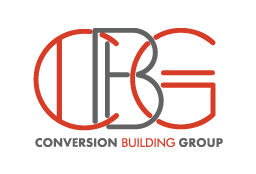Every successful construction project shares one thing in common: strong leadership and seamless coordination. This is where the role of a general contractor becomes crucial. A general contractor (GC) is more than just a builder they act as the central figure ensuring that architects, engineers, subcontractors, and suppliers collaborate effectively. As a result, projects are delivered on time, within budget, and with consistent quality.
At Conversion Building Group, our role as a general contractor extends far beyond supervising crews. We serve as the bridge between project owners and every moving part of construction, transforming complex visions into real-world results.
What Does a General Contractor Do?
A general contractor is responsible for overseeing and managing every stage of a construction project. More specifically, they:
- Manage the entire process from planning to delivery
- Hire and supervise subcontractors
- Organize materials, labor, and equipment
- Ensure compliance with building codes and safety standards
In short, the GC is like a “project quarterback,” guiding strategy, execution, and problem-solving at every step.

Key Responsibilities of a General Contractor
1. Project Planning & Pre-Construction
Before any ground is broken, the GC plays a vital role in:
- Reviewing blueprints and project designs
- Estimating costs and timelines
- Identifying risks and preparing solutions
- Collaborating with architects and engineers
This preparation ensures smoother execution once construction begins.
2. Hiring & Managing Subcontractors
Instead of owners managing multiple trades directly, the GC:
- Selects qualified subcontractors
- Negotiates contracts
- Coordinates schedules
- Ensures accountability and quality
This allows owners to focus on big-picture decisions while the GC handles day-to-day operations.
3. Budget & Cost Control
A general contractor plays a key role in financial oversight by:
- Monitoring project budgets
- Negotiating better material costs
- Preventing delays through proactive planning
This keeps projects financially viable and reduces unnecessary expenses.
4. Scheduling & Timeline Management
Construction involves overlapping tasks, and the GC ensures efficiency by:
- Sequencing activities in the right order
- Avoiding cascading delays
- Tracking milestones and deadlines
At Conversion Building Group, this ties directly into our Strategic Scheduling services, which guarantee on-time delivery.
5. Safety & Compliance
Compliance and safety are top priorities. The GC ensures that all sites meet:
- OSHA safety regulations
- Local building codes
- Environmental standards
This not only protects workers but also safeguards the project’s credibility.
Why the Role of a General Contractor Is Essential
- Single Point of Accountability – One partner to oversee all aspects of the project
- Time & Cost Savings – Reduced delays, errors, and inefficiencies
- Risk Management – Rapid problem-solving if issues arise
- Quality Assurance – High standards at every stage of construction
General Contracting at Conversion Building Group
Our team specializes in general contracting and construction management for residential and commercial projects. We provide:
- End-to-End Project Oversight – From planning to final inspection
- Trusted Subcontractor Network – Experienced professionals across all trades
- Strategic Scheduling – Proven systems for efficiency and on-time delivery
- Drone Technology – For accurate site monitoring and progress tracking
- Project Recovery Expertise – Turning around struggling projects
Conclusion: Building Success Through Leadership
In today’s construction industry, the role of a general contractor has never been more important. From pre-construction planning to final delivery, GCs bring the leadership, expertise, and accountability that ensure project success.
At Conversion Building Group, we combine decades of experience with innovative solutions to deliver exceptional results.
Ready to start your next project? Contact us today to learn how our general contracting expertise can bring your vision to life.
A general contractor manages and coordinates all stages of a construction project—from planning and scheduling to supervision and completion. They handle subcontractors, ensure compliance with safety codes, manage costs, and maintain quality throughout the process.
A general contractor uses proactive planning, Strategic Scheduling, and the Critical Path Method (CPM) to identify potential bottlenecks early. They also document delays in the schedule and make necessary adjustments to keep the project on track.
Drone Photography allows general contractors to monitor site progress, inspect hard-to-reach areas, and maintain visual documentation for safety and reporting purposes. It helps improve accuracy, transparency, and decision-making during all phases of the project.
Strategic Scheduling is a systematic approach to organizing project activities in a way that ensures smooth progress and timely delivery. At Conversion Building Group, this process integrates data-driven planning tools and the Critical Path Method to maintain control over timelines.
General contractors develop and oversee the Overall Project Schedule (OPS), which coordinates timelines for all subcontractors, suppliers, and project milestones. This ensures that every part of the project aligns with the planned completion date.
A general contractor provides leadership, accountability, and coordination between different trades. They ensure compliance with regulations, manage budgets efficiently, and deliver projects on time and within budget—all while maintaining the highest quality standards.
